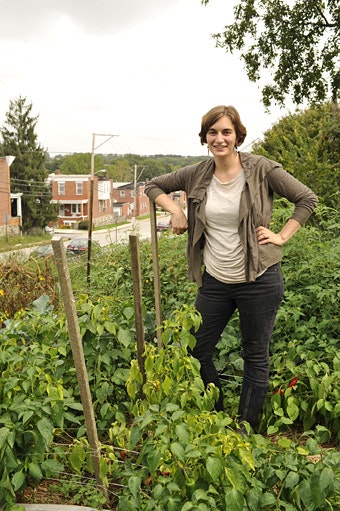Helping Urban Farms Grow
By Tania Cordes

As Americans strive for better health, urban farms are gaining in popularity across the nation. But significant challenges exist when it comes to starting and maintaining a successful urban farm, says Maya Kosok.
“In order to start a farming venture you need capital resources or a financial safety net or you need to already have an existing background in farming,” Kosok says. “And right now, there’s not a tremendous amount of profit coming out of this industry. I think we’re on our way to a place where urban farming is going to have more economic viability. But that opportunity will not be available to a lot of people in Baltimore unless we take steps to address some of the barriers that exist.”
Kosok has ideas she thinks will help.
She will use her OSI-Baltimore Community Fellowship to create a mechanism by which new and existing farmers can gain access to opportunities and resources—such as large equipment, labor and marketing—that will help to ensure their success. The project will help create economic opportunity for city-based farmers, with the larger goal of increasing food access and food education throughout the city.
“In Baltimore city, there’s a perfect storm of vacant land, unemployment and the reality that we are all already purchasing food.” Kosok says. “We’re just trying to localize purchasing a little bit to benefit city residents. There’s the real possibility of producing a significant amount of food if we capitalize on vacant land and the potential of our workforce.”
Kosok’s project—which will be an agricultural alliance or a growers cooperative when it is more fully fleshed out—will make it easier for small farmers to thrive.
“A lot of what I will be doing is talking with people and listening to what existing farmers and aspiring farmers identify as a need,” she says. “And some of the solutions and resources will include a combination of equipment, expertise, resources and labor.”
Equipment, Kosok says, is a major obstacle for small farmers. Tillers and tractors, for example, are costly and hard to store. And even small farms need significant refrigeration space to keep produce that doesn’t sell right away. Kosok’s project will explore solutions, such as having shared access to large machinery, to address financial barriers.
City farmers also could benefit from training about growing methods, Kosok says. They might be able to make use of shared marketing and volunteer labor, or a bulk ordering program for necessities such as plastic sheeting, natural fertilizer or seeds.
“A lot of this is just pooling resources,” she says. “This happens informally on a certain level in the farming community now. Part of what I’m going to be doing is raising money or in-kind assistance to get these things going in a more organized and official way.”
Kosok says such a co-op would benefit not only the farmers and neighbors who buy from them but also the city as a whole.
“As more of these farms pop up, I see them becoming a network of mini-hubs, so each farm is really localized in its community but is also a jumping off point for food education and food access for others in the city,” she says.
A history major with farming experience in California and Maryland, Kosok is grateful to OSI-Baltimore for this opportunity to combine her true passions for food access, nutrition education and community-building.
“Through the help of this fellowship,” she says, “I would be thrilled to see urban agriculture in Baltimore at a place where there are lots of productive farms, lots of opportunities for new farmers to build a business and lots of opportunities for city residents to access better and fresher foods than ever before.”
Until November 2015, Tania Cordes was the communications coordinator for the Open Society Institute–Baltimore.